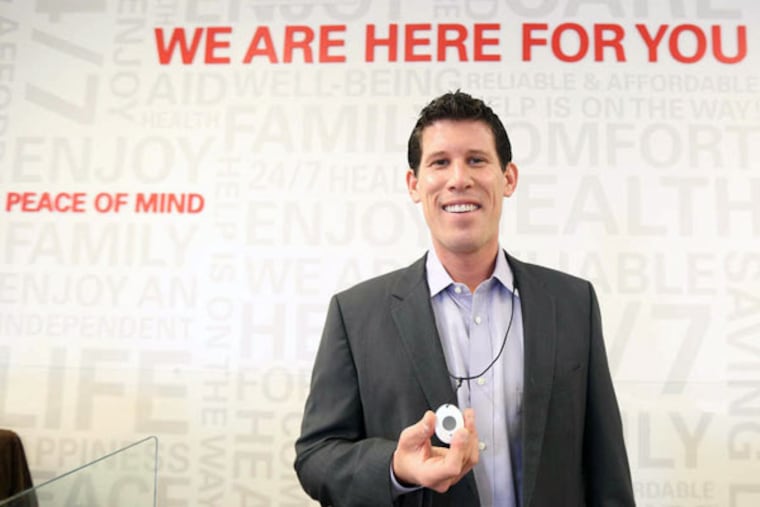Millennials successfully selling medical-alert devices for seniors
The first thing that struck me when I walked into the Center City offices of Medical Guardian - besides the life-size cutout of Florence Henderson - was the youthful skew of the workforce, considering its target market.

The first thing that struck me when I walked into the Center City offices of Medical Guardian - besides the life-size cutout of Florence Henderson - was the youthful skew of the workforce, considering its target market.
Eighty is the average age of those using the medical-alert devices that Medical Guardian sells. The average age of those peddling them: 31; the marketing director is even younger, 29. They are pushing products they shouldn't need for dozens of years.
The company's appeal to younger workers surprises even founder and CEO Geoff Gross.
"It's interesting because you wouldn't initially think that a young person would be able to relate to what the older generations are experiencing," said Gross, who at 35 is a millennial. He added: "There's nothing sexy about the medical-alert industry."
But it is lucrative, with industry sales projected to exceed $2 billion by 2020.
At Medical Guardian, the financials are showing no signs of the generation(s) gap between staff and clients. Since Gross created the company in 2005 - making the first 2,500 sales himself - revenues have consistently grown, reaching $14.4 million last year, up from $10.9 million in 2013. That landed Medical Guardian on the Philly 100 list of the region's fastest-growing, privately held companies for those years.
For proprietary reasons, Gross would not provide specifics on the size of Medical Guardian's account base, saying only that it consists of "tens of thousands." The company, which does not manufacture any devices, sells those of three different product providers - from traditional home units, to mobile ones no bigger than a credit card that are waterproof and equipped with GPS and automatic fall detection. Monitoring is by a third party.
The industry's consumer demographic requires a fair amount of empathy from those selling in it, said Jay I. Sinha, association professor of marketing and supply-chain management at Temple University's Fox School of Business and an expert in branding and marketing strategy.
"What I would advise these young people is not to apply the hard sell, which makes [elderly consumers] feel concerned, anxious," he said.
They also "tend to be more price-sensitive," and they need "considerable customer education," Sinha said. That makes empathy one of the most important qualities for those selling to that group.
Agreed, said Matt Guerrieri, the millennial who heads Medical Guardian's marketing.
"It's more about how you treat people than advertising and marketing," Guerrieri said.
It's also understanding that the regular rules of website efficacy do not apply. Forget the "popping, eye-catching videos," he said. Medical Guardian's target customers "like to read, like to digest information, take their time with it," Guerrieri noted.
At the same time, it involves addressing the children of the people these companies are trying to reach, said Kurt Shore, president of D4 Creative Group, a Philadelphia advertising agency. "It's the old folks' kids who make most of the purchasing decisions. . . . So the product makers must market to the boomers whose parents need their wares."
Another challenge is customer retention. "Attrition is a big part of this business," Gross said, citing rates of 30 percent to 35 percent.
Contrary to what you might think, more than half of cancellations are due not to death, but to a sense by clients who have not needed to press the panic button for help that they aren't getting anything for their $30 to $50 monthly investment.
That's why the key to success is customer education and an inspired workforce, experts said.
At Medical Guardian, the latter is aided by employee excursions such as 15 minutes in the office massage chair and tickets to a Phillies game, as well as competitive pay.
Most sales are initiated online, some coaxed by spokeswoman Henderson. Remembered as the nurturing mother in The Brady Bunch, she is now 81 and "independent, active, alone and not in bad shape," Gross said.
"I just had no second choice," he said. "Betty White is 93. She's much older than our clients."
215-854-2466 @dmastrull